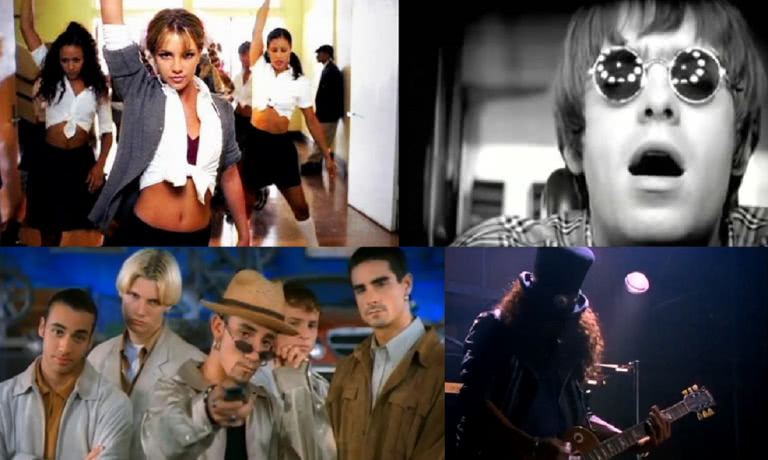You might not recognise his name, but you’ll certainly be familiar with his work.
Nigel Dick, a British-born and LA-based filmmaker, has been responsible for hundreds of iconic music videos since the mid-1980s, with an enormous credits list including clips by Backstreet Boys (‘As Long As You Love Me’), Britney Spears (‘…Baby One More Time’), Oasis (‘Wonderwall’), R.E.M. (‘At My Most Beautiful’), Matchbox Twenty (‘Push’) and even Nickelback (‘Photograph’), to name a few.
Dick is on his way to Sydney this weekend for the inaugural CLIPPED: Music Video Festival at Vivid Sydney, where he’ll appear on a series of panels and in conversation with fellow Brit director David Wilson. Ahead of his visit, we asked Dick about his career.
You’ve directed music videos for an enormous amount of big-name artists, from Elton John and Britney Spears to Guns N’ Roses and Oasis. Do any of your shoots stand out as particularly challenging?
Nearly every shoot is a challenge. And if it’s not been challenging when the day is done I get very worried about how good the final outcome will be! But as well as the normal concerns about too much to be done in the allotted time, not enough money to really do the idea justice (which is pretty much every job), you have extra challenges like… singers walking off the set in the middle of a take and disappearing to the pub for two hours, singers locking themselves in their dressing room for two hours, band members being carted off to jail on the morning of the shoot (I had to stand in for that guy!), band members trying to rock out on set with their arm in a cast, guitar players refusing to take part unless the idea is changed to suit their particular vision (twice!), the entire band going on strike and refusing to take part because the label has switched the version of the song (twice!), bands refusing to go on set because the crew was eating meat for breakfast, bands beating up the wardrobe lady in the wardrobe trailer, half the band being rushed to hospital due to heat exhaustion, the band breaking up on the morning of the shoot and flying home before they reached the set, the producer racing from set to go and have a baby…
I could go on, and on, and on. In short – yes, it can be quite challenging. I say my job is 50 per cent diplomacy, 25 per cent work and 25 per cent art.
How involved do bands like to be in the creative process?
Some could care less and just want to go and play football (soccer) outside. Some want to nitpick every single little detail: “There’s one in every band, and I’m that guy!”
How did you come to be involved in the music video industry, and is there a particularly good career path for a young director to take into shooting music videos?
By accident. I worked for a record label and took lots of photos of the bands in my spare time. One day they needed a video for an artist whose career was in decline. I was pulled into a small dark office and was told, “You like taking photos, make a video for this guy! You have two grand and we need it by Friday.”
In answer to part two of your question: start shooting now – even if it’s with your iPhone – and never stop. Eventually you’ll get lucky and shoot a video for a hit song and you’re off to the races. That’s all you need – a hit (not a great video). By the way, it’s never been easier to get your directing career off the ground than now – if you have a laptop and that iPhone I was talking about, you have the tools to be a filmmaker. All you need now is an idea!
For those of us who only see the final product, just how much time and how many people are involved in the shooting of a video clip for a ‘big’ single?
The biggest crew I ever had was for a Celine Dion video I shot in Prague. There were 120 people in the art department alone. The smallest video I’ve ever done had a crew of one – me. The longest I ever took to turn a job around was maybe five weeks. The shortest was 36 hours.
Is the advent of YouTube and similar streaming services a good thing for the music video industry, compared to say, MTV?
I could spend an hour trying to answer that – and there are many cogent answers with differing conclusions – but the thing that’s really changed the video industry most is the fact that no-one buys records or CDs anymore. Everyone gets their music almost for free, so videos are created for very different reasons now and normally with much smaller budgets.
That’s why it’s great an event like CLIPPED Music Video Festival has come to fruition because it gives people other ways to engage with music videos that they wouldn’t necessarily find amongst the thousands of other clips on YouTube. I’m looking forward to talking more on this topic during the discussion panels this Saturday at CLIPPED, a Vivid Ideas event.
CLIPPED: Music Video Festival runs from Friday June 10 – Monday June 13 at The Works Glebe as part of Vivid Ideas 2016.

































